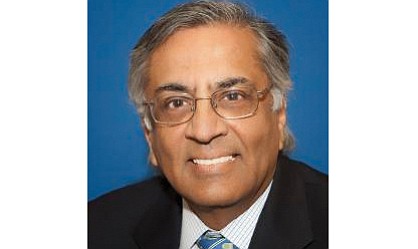A new lease
T.K. Somanath resigns from the Richmond Redevelopment and Housing Authority amid criticism regarding heating crisis
Jeremy M. Lazarus | 1/26/2018, 12:01 p.m.
By Jeremy M. Lazarus
Battered by criticism over his handling of a heating crisis in the Creighton Court public housing community, T.K. Somanath abruptly resigned Sunday as chief executive officer of the Richmond Redevelopment and Housing Authority.
Brought out of retirement to guide the housing agency, the 72-year-old civil engineer has left behind an array of still incomplete projects and an agency that has yet to regain public confidence.
Robert J. Adams, a housing and development consultant who chairs the RRHA’s Board of Commissioners, expressed gratitude for Mr. Somanath’s service “and notably his accomplishments in beginning the critical work of replacing RRHA’s aging public housing portfolio.”
Mr. Somanath came to RRHA’s leadership with a long track record in low-income housing.
The India-born emigrée had spent 16 years at RRHA working on housing development, followed by 24 years leading the nonprofit Better Housing Coalition to develop hundreds of homes and apartments for low- to moderate-income families.
He came out of retirement three years ago with high expectations that his long experience could aid RRHA after the board removed the previous director, Adrienne Goolsby, in early 2015.
He only expected to stay six months, but then took the job permanently.
Mr. Somanath remained highly regarded until recently, when he received blistering criticism for failing to address non-working heating systems that left many RRHA residents in the cold. Most notably about 50 families in Creighton Court, where furnaces in 12 buildings where shut off, were without heat as bitter cold hit Richmond.
While RRHA quietly jumped to replace broken equipment and to restore heat in the Gilpin Court and Whitcomb Court communities, Mr. Somanath and his staff drew fire after admitting they had known since October that the Creighton Court buildings had no heat. RRHA did little more than distribute space heaters to residents while seeking a more permanent solution.
Confidence in Mr. Somanath eroded amid a drumbeat of media reports about the issue, including a Free Press report published in the Jan. 11-13 edition about residents in Creighton Court, Hillside Court and other public housing communities using ovens and wearing extra clothes to try to keep warm. Some residents left their apartments and moved in with relatives, while a local hotel operator offered free rooms to help end the misery.
Advocates for residents stepped up their call for Mr. Somanath’s resignation, while officials, including Richmond area Congressman A. Donald McEachin, began demanding that RRHA correct the “intolerable living situation” that would have led private landlords to have their buildings condemned.
Congressman McEachin did not comment on Mr. Somanath’s departure this week, but stated Tuesday that “inadequate space heaters was never a reasonable solution” for residents during dangerously cold temperatures.
He also stated that he would “continue to be vigilant and be a partner (with RRHA) to ensure all residents have decent, clean and healthy shelter” as the housing authority moves forward.
Ahead of Mr. Somanath’s departure, the RRHA board chairman appointed a special committee to focus on such issues and to ensure better responses to emergencies.
On Monday, the day after Mr. Somanath left, the RRHA started installing electric baseboard heat in the affected Creighton Court apartments, although the authority has yet to take similar action for units in Hillside Court and other communities where residents also have reported heating failures.
The heating issue has overshadowed concerns about other RRHA projects. For example, RRHA and its development partner are still struggling to replace Fay Towers in Gilpin Court, a project that was in the works when Mr. Somanath took over in 2015.
A city-backed effort to replace Creighton Court is just getting started, but funding is still a question mark for much of the promised East End development.
And despite his vow to be a “servant leader,” Mr. Somanath does not appear to have changed the “us versus them” mentality that often characterizes relationships between staff and the tenants of public housing.
Nor have promised cameras and other equipment been installed to assist police in dealing with the high level of crime that continues to plague RRHA’s public housing communities.
Mr. Somanath’s departure drew mixed reviews.
Mayor Levar M. Stoney issued a statement of appreciation for his service, but went on to state: “We look forward to working with the RRHA board and new leadership of the housing authority to address its ongoing issues and work toward better long-term outcomes for the residents.”
City Councilwoman Reva M. Trammell, 8th District, said Mr. Somanath had been accessible, but she expressed disappointment that on his watch, there were “issues that were not addressed. I don’t think everyone was on the same page or even at the table” during his tenure, she said.
Art Burton, who has sought to uplift public housing residents through the Kinfolk Community Empowerment Center and who has campaigned for the ouster of Mr. Somanath since September, told City Council on Monday night that Mr. Somanath’s departure “does not end the problems with RRHA.”
He said new leadership is needed that “will not turn its back” on residents and, instead, will focus on working with residents to build up their neighborhoods as required by federal regulations.
Omari Al-Qadaffi of Leaders of the New South also expressed relief that Mr. Somanath is gone, but told City Council that RRHA needs to be pushed into doing its job to make public housing communities quality places to live.







